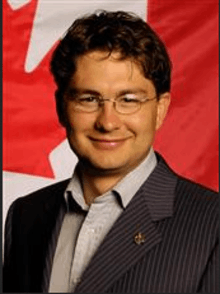Minister for Democratic Reform (Canada)
| Minister of State for Democratic Reform of Canada | |
|---|---|
| Government of Canada | |
| Style | The Honourable |
| Member of |
|
| Appointer | Governor General of Canada |
| Term length | At Her Majesty's pleasure |
| Inaugural holder | Jacques Saada |
| Formation | December 12, 2003 |
.svg.png) |
| This article is part of a series on the politics and government of Canada |
|
Court system
|
|
Canadian federalism Monarchy in the Canadian provinces Executive Councils |
|
General
|
|
Canadian politics portal |
The Minister for Democratic Reform or Minister of State (Democratic Reform) (previously called the Minister responsible for Democratic Reform and the Minister responsible for Democratic Renewal) is a Minister of the Crown in the Canadian Cabinet, associated with the Privy Council Office.
The position was created by Prime Minister Paul Martin when he succeeded Jean Chrétien in December 2003 under the title Minister responsible for Democratic Reform to address the "democratic deficit", an issue Martin campaigned on when he ran for leader of the Liberal Party of Canada.
The portfolio was initially held by the Government House Leader, Jacques Saada, in Martin's first cabinet. After the 2004 election, the portfolio was given to Mauril Bélanger, who was the deputy government house leader.
When Belinda Stronach crossed the floor from the Conservative Party to Liberals on May 17, 2005, she assumed responsibilities for the portfolio along with the post of Minister of Human Resources and Skills Development. At this point the title was changed from "Democratic Reform" to "Democratic Renewal".
Under the premiership of Stephen Harper, the post was first held by his first two House Leaders (Rob Nicholson and Peter Van Loan) as "Leader of the House of Commons and Minister for Democratic Reform". In 2008, the role was taken up by Steven Fletcher as "Minister of State (Democratic Reform)" and the current minister, Pierre Poilievre, holds the same title.
The minister has been instructed to table an action plan outlining proposals to reform the operations of the Canadian House of Commons in order to increase the role of individual Members of Parliament in the House and its committees. Proposals include allowing more free votes, giving committees more authority, increase research budgets, allowing chairs of house committees to be elected rather than appointed by the prime minister, giving MPs a role in choosing which committees they sit on rather than having them assigned by the prime minister or government house leader.
